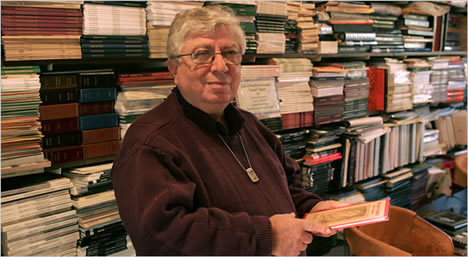|
STANLEY H. BARKAN recalls how his stepfather, Jack Stitzer, used to kid him about his writing, saying, “How much money does a poet make?”.
Mr. Barkan, 70, said, “He thought all my life I would have the word ‘schmo’ written on my forehead.”
But Mr. Barkan persevered, writing poetry as well as publishing poems and stories from around the world. His company, Cross-Cultural Communications, based at his home here, has published more than 350 books. Among them are seven collections of his own poetry, and he has had another seven published elsewhere.
A longtime teacher, linguist, kabbalist, occult explorer and world traveler, Mr. Barkan has tried to bring people together by publishing works translated into English from more than 50 languages. He does it “24/7, 365 days a year,” he says, “except for Yom Kippur and Rosh Hashana.”
His goal, he says, is “presenting the essence of cultures.”
The literary translator Gregory Rabassa, who has translated the poetry of the Brazilian Vinicius de Moraes for Mr. Barkan, calls him “an adventurous publisher and adventurous poet.”
“I don’t know of any other publisher who has done so much translation of foreign poetry all over the world, not just European, but Asian and African,” said Mr. Rabassa, who is distinguished professor of Hispanic languages and literature at Queens College.
This month Mr. Barkan will give readings in Manhattan of works by two men whose poetry he has published in translation: the Majorcan Joan Alcover, at the Roger Smith Hotel on Tuesday; and the Peruvian Isaac Goldemberg at the Cornelia Street Cafe on Feb. 21. Mr. Goldemberg will also read his Spanish translations of Mr. Barkan’s poems.
Mr. Barkan grew up in Brooklyn and received a bachelor’s degree in education from the University of Miami and a master’s in English linguistics from New York University. He taught English at high schools in Brooklyn and Queens from 1964 until his retirement in 1991, the year he won the New York City Poetry Teacher of the Year Award.
He founded Cross-Cultural Communications in 1971 as an offshoot of the short-lived Cross-Cultural Communications Institute he directed at Long Island University’s Brooklyn Center. The institute faded, but Mr. Barkan went on to publish works by Pablo Neruda, Allen Ginsberg, Isaac Asimov and the Pulitzer Prize-winning poet Stanley Kunitz, a friend of Mr. Barkan’s, who died in May.
Along the way, Mr. Barkan has organized 16 poetry readings at the United Nations, taught occult science at Long Island University (students learned about tarot cards and palmistry) and directed a Barnes & Noble multicultural reading series. He also gives poetry readings around the world, most recently in Swansea, Wales, the birthplace of Dylan Thomas.
These days, Mr. Barkan, who has already published six books in translation from Korean, is working on contracts for four more. He is also looking forward to the publication this year of books translated from Norwegian and Farsi, and is bringing out an anthology of local interest, “Paumanok: Poetry and Pictures of Long Island.”
Next year he is planning to publish the poetry of Aeronwy Thomas, Dylan Thomas’s daughter, and to bring her to the United States for a book tour along with the Welsh poet and publisher Peter Thabit Jones.
By spreading culture, Mr. Barkan hopes to allow people to “meet on an essential level,” he said.
“And perhaps that would diminish the desire to harm one another,” he added. “They would realize how beautiful — how vital, creative and delightful — they are, these various people.”
He has visited 25 countries — his Spanish-style house in the Gables section of Merrick is filled with the bric-a-brac of many lands — and says he is proficient in six languages other than English: Russian, Spanish, Italian, Swahili, Yiddish and Hebrew.
To quote Mr. Barkan’s wife, Bebe, an artist and designer who is his main muse, “Stanley is a whirling dervish.”
Mr. Barkan has, of course, written about her: “Bebe, my Brooklyn rose among the women of thorns/unique, full of petals and fragrance, and no sharp thing.”
|







